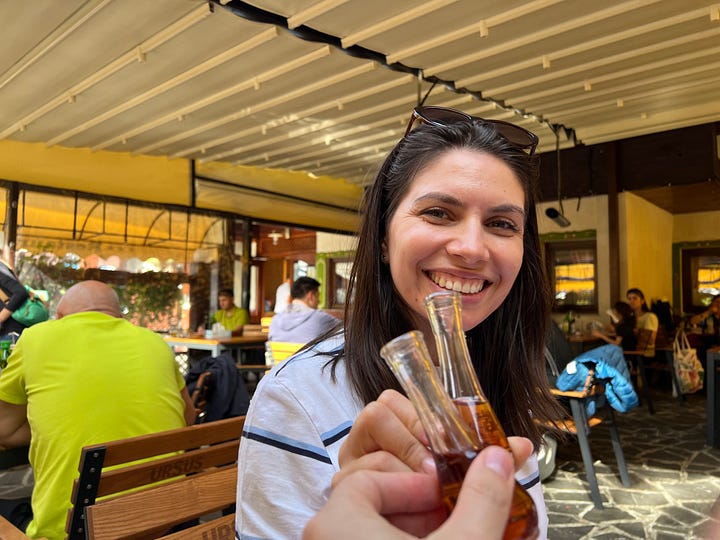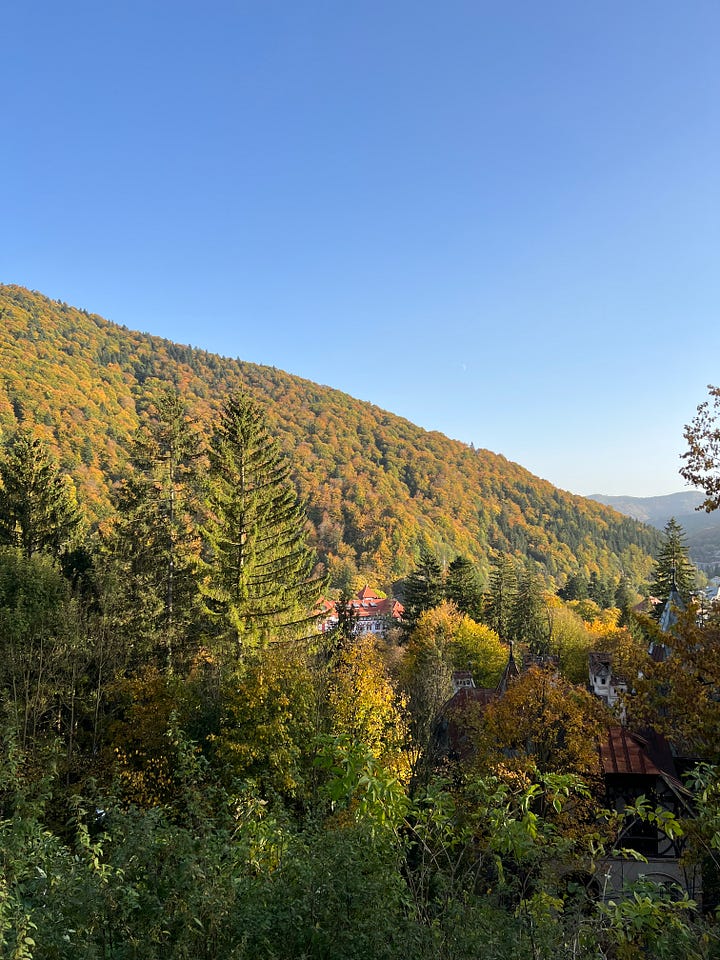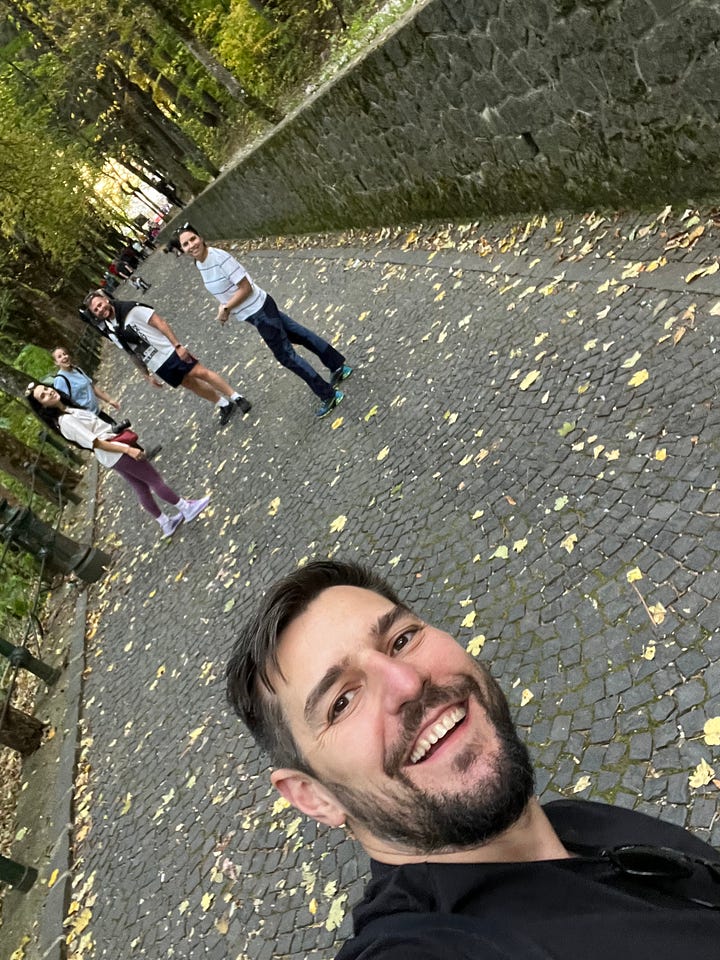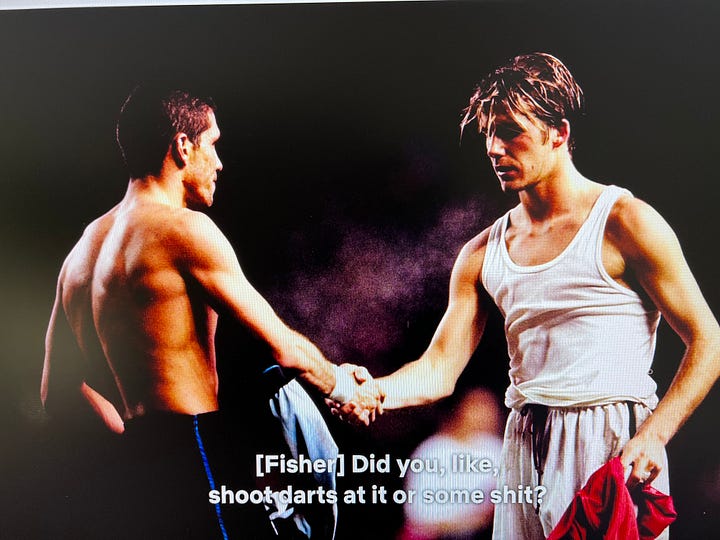#28: How often do you step outside your comfort zone?
And how important this is for our development
Hey friends,
For the first time this year, I felt like autumn was here.
Being on vacation, running the race, and just staying in hot weather didn’t make me feel like the summer was over.
But I felt it this week. We had some cold days, and there was that smell of burning leaves in the air that took me back to my childhood.
Nothing revives the past so completely as a smell that was once associated with it.
―Vladimir Nabokov
There is a science behind this; it seems that smell is the sense that can bring the most vivid memories and can induce a feeling of nostalgia.
And that’s what happens to me, usually in the autumn or winter.
That’s why these days I was filled with so many memories from the days I would wake up early and my mom would take me to school. It was full of fallen leaves everywhere, and I would stop to pick up chestnuts while my mom was hurrying me up so I could get to school on time and she could be at work on time.
How time passes. And how peacefully I remember those days!
Anyway, that’s how I felt this week, but I didn’t have that much time to think about the past as I had a very busy week.
It was Deloitte’s Annual Tax & Legal Conference Week, which is the most important marketing event of the year for the local company. So I was quite busy on Monday and Tuesday, making sure everything went smoothly in the Tech Corner that I’m responsible for.
On Wednesday, I participated in my first-ever work webinar, where I discussed with my colleagues the role of AI in the digital transformation journey of tax and legal departments and how companies should approach this adoption.
It was a fun experience, but I was quite nervous.
Next time, it will be better.
So things were a bit stressful during the workweek. As Saturday was my wife’s birthday, we decided to go to a mountain resort for the day.
We went there by train in the morning, walked around, had some beers, ate something, had some cake, and got a train back in the evening. We ended the day with a burger in Bucharest and went home to watch the Rugby World Cup semi-final.
It was an excellent day, and we will probably repeat the experience.
I love the autumn colors in the mountains; it’s probably one of my favorite things, and seeing them with friends and family is priceless.




So many people choose to drive to the mountains when it’s so convenient to take the train. Instead of sitting in traffic (and polluting), we talked for 3 hours and planned at least 3 vacations for next year.
As both I and my friend Marta competed in the last half-marathon and started running more seriously, we decided it would be fun to run another half-marathon in another country. And the best option seems to be Florence in April.
We also talked about going on a ski trip in March and a Christmas vacation in London and Bath next year.
We’ll see if we’ll really do all these things, but at least we have a plan.
We’ve also kind of decided to buy a dog after babysitting a lovely Labrador for a week, so we’re looking into what the best breed would be for us.
If you can recommend a breed that is not very small, doesn’t have too many health issues, and would be easy to accommodate in a medium-sized apartment, please reply to this letter.
Pushing outside the comfort zone
I can’t stop thinking about my race and how fast my pace was in comparison to the pace I set as a goal.
Let's go into detail a bit.
When I first decided to run the 21K, I set a goal to just finish the race.
Then I said, Maybe I can finish with a pace of 6 km/h
A few days before the race, I was thinking so much about whether I should try and finish it in 2 hours (that meant a pace of 5:40 K/h). That was not a comfortable pace for me, and I had never run so long in my life, so I was very reluctant to run the whole race at that pace.
When I finally decided to go with this pace, I met with a friend one day before the race, and he told me he planned to run faster than that.
Now, I must say, my ego got the best of me, and I said, If he can do it, I can do it too.
So I started the race with the (final) goal of ending it with a pace of around 5:30 km/hour.
And I ran the first part of the race—maybe the first 5–6K—with my friend. And he had an interesting strategy: to run a bit faster at the beginning and then slow down.
I usually have the opposite strategy in all my races and exercises, which is to start a bit slower, keep it constant throughout the workout, and push a bit faster in the end.
But I liked running with a friend and I tried to keep up with his pace, even though it hurt a bit, but I managed it.
After a while, he got a bit tired and slowed down a bit. I felt good, so I decided to try and keep the pace, so, unfortunately, I left him a bit behind.
So I continued my race at pretty much that constant pace until the last 3–4 km when someone I know from the gym gained up on me. And he had a crazy pace of around 5 km/hour.
Now, people who constantly run understand what a 30-second difference in pace means. I tell you, it’s a lot.
But it was the end of the race, and I felt good, so I pushed myself. I kept up with him and ran the last part of the race at this very fast (for me) pace.
The final result: 1:51:34, with a pace of 5:17 km/hour.
I am happy about this, but it also got me thinking.
How often do we set our own limits?
Throughout human history, there's been one consistent marker of progress and growth:
Our ability to embrace and adapt to discomfort
This week, I'd like to dive deep into the concept of stepping outside our comfort zones and the transformative power it holds, not just in our careers but in every facet of our lives.
Evolutionary Roots of Discomfort
From an evolutionary standpoint, our ancestors were no strangers to discomfort. Venturing out of the safety of caves, confronting wild animals, and adapting to fluctuating climates, they were constantly pushing boundaries.
This inclination wasn't just about survival; it was about growth. By facing challenges head-on, early humans developed tools, honed skills, and forged communities.
Their willingness to face the unknown laid the groundwork for human civilization.
Historical Pioneers: Embracing the Unknown
Throughout history, great leaps of progress have often been made by individuals who dared to challenge the status quo.
Think of explorers like Magellan and Amelia Earhart or inventors like Marie Curie and Nikola Tesla.
Their achievements were not the results of playing it safe but of pushing the boundaries of what was known and understood.
The Modern Context: Career and Personal Growth
In today's fast-paced professional landscape, staying static is not an option.
The most successful individuals are those who continuously seek out challenges, whether it's in the form of new projects, unfamiliar roles, or learning areas outside of their expertise.
This principle isn't just limited to career growth. Think about personal development, relationships, or even hobbies. Embracing discomfort in all these areas paves the way for richer experiences and deeper insights.
Systems for Growth: Beyond Just Hard Work
It's essential to understand that stepping out of one's comfort zone isn't about reckless risk-taking.
It's about calculated challenges, much like the systems for life optimization I often write about.
It's about setting up an environment where you're continuously learning, adapting, and growing.
By actively seeking out discomfort, we're not just reacting to challenges but proactively shaping our growth trajectory.
The Curiosity Quotient: Fueling the Drive
At the heart of all this lies a profound sense of curiosity.
Just as our ancestors were driven by a need to understand the world around them, our growth, both personal and professional, is fueled by the desire to know more, do more, and be more.
It's this curiosity that propels us beyond our comfort zones and into the vast realm of possibilities.
Comfort, while reassuring, often holds us back from our true potential.
When I look back on my life, I can see clearly that I often took the easy route.
not publishing online
not pushing my physical limits
staying in a job longer than I should have
They have all given me comfort. But also regret.
I am at a moment in life when I try to learn and do a lot of things. I tried snowboarding for the first time this year, paddleboarding, and ran the half-marathon.
And of course, I’ve been writing constantly.
So I expect to try more and more things.
It’s never too late to push your limits.
Send me a reply and tell me what you plan to do to step out of your comfort zone.
Recommendation: Beckham, on Netflix
Beckham is one of those shows you will enjoy even if you don’t like football.
I enjoyed it quite a lot, because I like football and because he is part of a generation I grew up with, and I could remember most of the characters and situations from those days.
I don’t want to spoil it for you in any way. Of course, it tracks the on-pitch and off-pitch career of David Beckham, one of the most important players of his generation and probably one of the best players in the history of the England national team.
I just want to mention the quality I most admire, and the quality I feel is the most important for people who want to be successful.
And that is how we deal with failure.
He had many moments in his career when he had to overcome challenges. But there was one that stuck with me.
I think I have said this several times, as it is a stoic principle. More often than not, we don’t control what happens to us and we can never change the past.
What we can always control, though, is our response and the way we perceive and act.
During the ‘98 World Cup finals with Argentina, Beckham did a stupid thing to an Argentinian player; that guy overreacted, and David got sent off in the first half.
England played in 10 for almost the whole game and eventually lost on penalties.
The whole country held David responsible for the loss, and he was booed in all stadiums. People sent death threats to him and hanged mannequins with his shirt on.
After a year or so, he faced the same Argentinian player who caused his elimination, and at the end of the game, he swapped T-shirts with him.
The reporter asked him if he used the T-shirt to shoot darts at it, and Beckham said:


And this is the mindset difference that creates high achievers.
They cherish their mistakes, acknowledge them, and learn from them.
What use is there for holding resentment? None; it will only make you more bitter.
But remembering a mistake and making sure you never repeat that mistake—that is what separates the great from the rest.
Steve Jobs was ousted from Apple, the company he created, by the guy he brought in as CEO
J.K. Rowling faced many rejections before publishing Harry Potter. She kept her rejection letters as a reminder of her journey
Edison faced thousands of unsuccessful attempts before finding the right design. He famously remarked, “I have not failed. I've just found 10,000 ways that won't work.”
I was brought up in a culture where you would rather not try something than fail at it.
I understand now how wrong this approach is.
In conclusion, if you’re someone who watched football in the late 90s and 2010s, you’re going to love the show.
If you’re just someone who wants to take some inspiration from a very resilient performer, you’re going to love the show.
Thank you for reading, and let me know if you liked something in particular in this newsletter.
Until next time,
Leo
P.S.: If you would like to read my content daily, don’t forget to follow me on Twitter and Linkedin.
P.S. 2: If you want to take your productivity to the next level, check out my extensive Productivity course that can accelerate your career.





